
A clearing in the trees is all that remains of a house in Portapique, Nova Scotia, owned by the gunman in Canada's deadliest mass shooting. The shooter burned down his house before he set out on the road, pictured here, to murder 22 people in April 2020. The provincial government purchased the lot and razed what remained of the structure. Omar Ornelas/El Paso Times
After its worst mass shooting, Canada tightened gun control and forced a reckoning on gun violence. What can the U.S. learn from its neighbor?
A clearing in the trees is all that remains of a house in Portapique, Nova Scotia, owned by the gunman in Canada's deadliest mass shooting. The shooter burned down his house before he set out on the road, pictured here, to murder 22 people in April 2020. The provincial government purchased the lot and razed what remained of the structure. Omar Ornelas/El Paso Times
PORTAPIQUE, Nova Scotia ― Twice a day, every day, the tide rises to fill the Bay of Fundy and falls to leave it empty, baring its red clay seabed.
One night in April 2020, in the time it took for the bay's high tide to drain into the Atlantic and swell back up again to the wooded coast, a deranged man gunned down 22 people in their homes and on the street, in Portapique and the idyllic communities that line the west shore. The murderous rampage lasted 13 hours and became the deadliest mass shooting in Canada's history.
There were echoes of El Paso's Aug. 3, 2019, mass shooting tragedy nine months earlier: the same number of initial victims, a shooter with easy access in the U.S. to "assault-style" firearms, a hashtag ending in "strong."
But the quick public response following the tragedy in Canada ― from nation's highest authorities to local community members ― differed starkly from the response in the U.S. or Texas in the aftermath of mass shootings.
Canadians had the benefit of being truly shocked by the horror of its worst mass shooting ― and alarmed their country could go the way of the United States, where officials have more often responded to an epidemic of gun violence with thoughts and prayers instead of bold action.
Within weeks of the Nova Scotia mass shooting, the Canadian government banned 1,500 different assault weapons. The country strengthened its already strict red-flag laws, extending sales restrictions to people convicted of domestic violence. Conservatives criticized the Liberal Party for how it went about tightening gun control, but even many conservative, rural gun owners felt something had to be done.
In the wake of the El Paso mass shooting, Texas loosened gun restrictions, allowing people to openly carry a firearm without a permit. The U.S. Congress took its first bipartisan action on gun control in nearly 30 years in June when it increased background checks for gun buyers under 21 ― a move gun control advocates, gun violence survivors and the parents of slain children applauded but criticized as not going nearly far enough.
"We don't ever want to get used to things like this," said Michael Scott, a partner at Patterson Law in Halifax, which is representing families of 14 of 22 victims of the Nova Scotia mass shooting. "And I think the one thing that we all agree on is that we'll do whatever we need to do to make sure that it doesn't happen again."
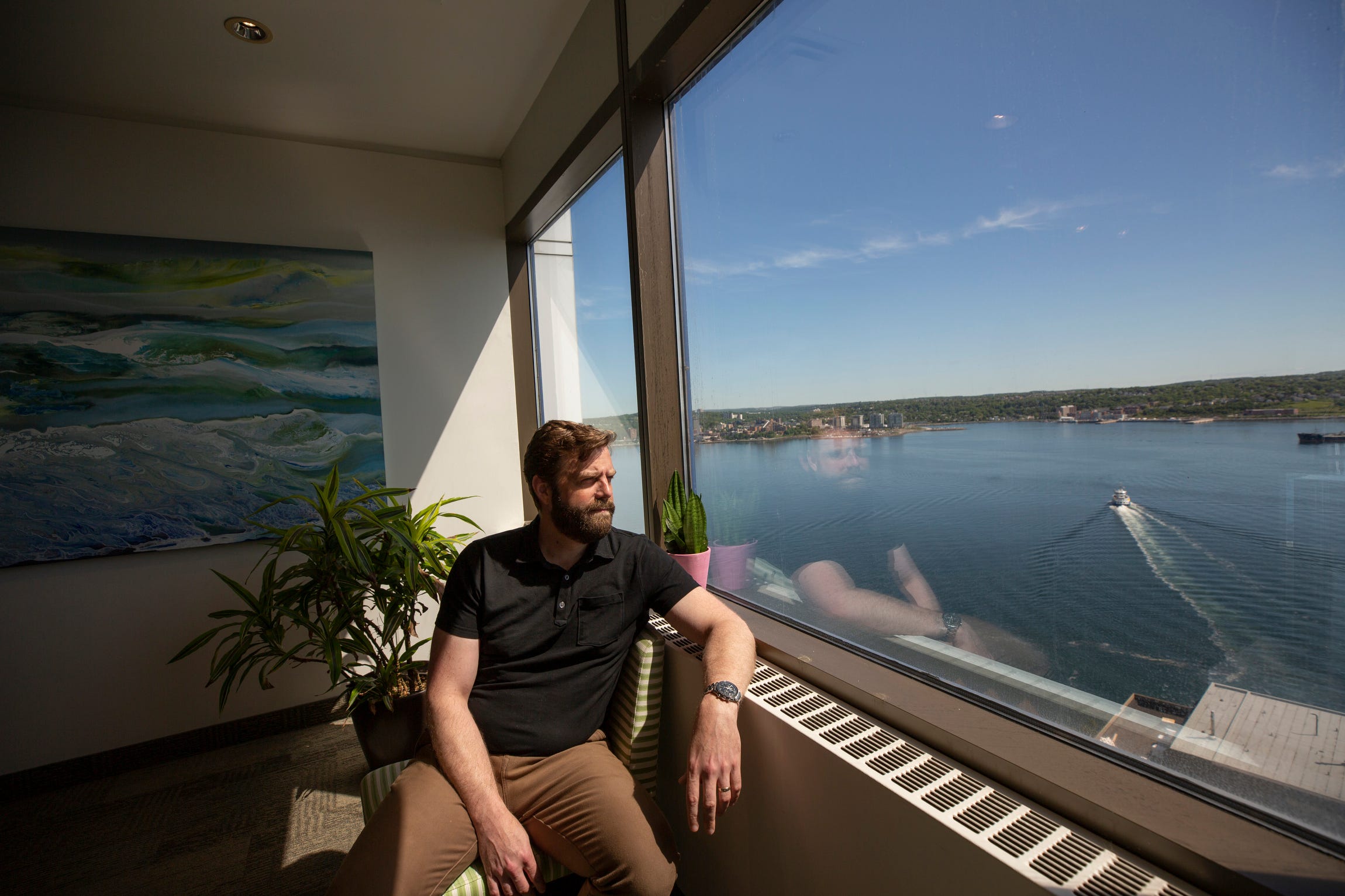
It was the Nova Scotia tragedy that brought Tessa Young, Dave Fulton, Sherry Turner and other locals to a Saturday morning farmer's market in Portapique, population about 125, in late June.
People lined up at a grill, where Fulton, who owns the local general store, was putting together bacon-and-egg sandwiches for a donation. Young handed him fresh eggs from the coop at her Red Clay Farm down the road. Turner sold bottled water, juice and soda for $1 Canadian from a cooler. There was fresh maple syrup bottled in Mason jars, bouquets of kale, homemade rhubarb jam and bundles of asparagus thick as cigars.
More:Why we remember Aug. 3, 2019: state Rep. Joe Moody
Many of the locals didn't know each other well two yearsago. They belonged to different generations; some were born and raised on the bay's west shore, while others were newcomers; they didn't share the same politics. But everyone knew someone who had died in the massacre; they now shared a bond in sadness and anger and determination to reweave a community that had unraveled with the tragedy.
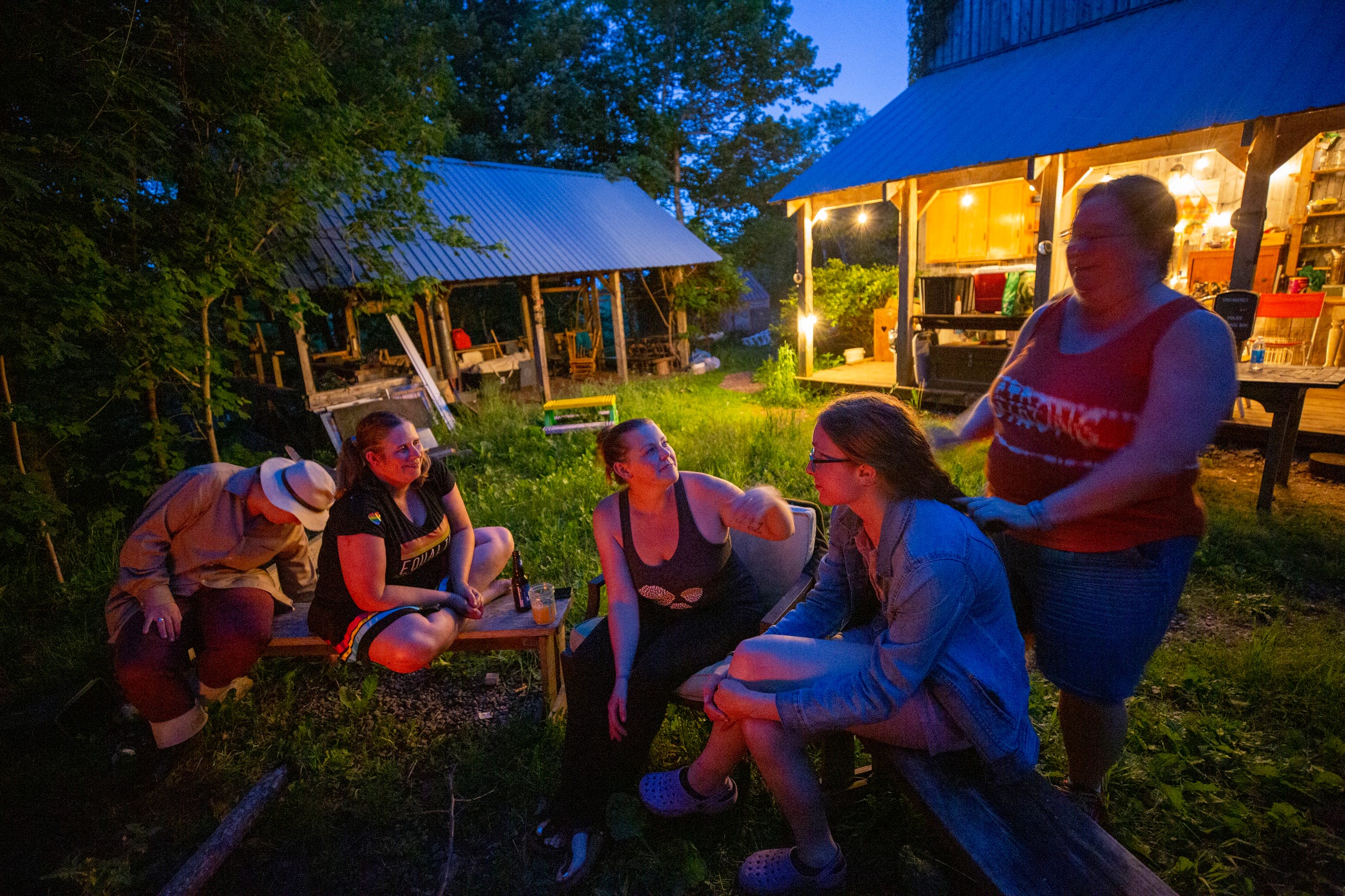
Where the farmer's market popped up on Saturdays, a recently dismantled 200-year-old hall had served as a resources center in the wake of the shooting. Hopes were high the community would break ground on a new community center in the same clearing, using the old hall's refurbished roof beams. A playground had already gone up, and children were running over sod they and their parents helped lay.
"The space is wonderful, but really, it's a symbol," Young said. "With the tragedy, everything was kind of shattered apart and, with COVID, too, people were just in this state of trauma and separation. And the point of this is to give the community a place to come back together and re-energize what we already have, which is a really vibrant community of people."
"It's not even built yet, and it has already changed people's lives," Turner said.
She grew up along the shore, but her sense of belonging was stronger than it had ever been after the tragedy, which happened in walking distance of her home. She began volunteering with the community center project, then joined the board. Forging relationships with her neighbors, in her eyes, was now a matter of life or death.
"Look what happened because we didn't know each other," she said.
‘It just kept getting worse and worse’
Nova Scotia springs are cloudy and wet, leaving the bay glistening in the soft gray colors of a dove. Tom Taggart woke up around dawn on Sunday, April 19, 2020, unaware the county he represented at the time as a municipal councilor was eight hours into an unimaginable tragedy.
He poured himself a cup of coffee and sat down at his computer to cruise Facebook. Friends were posting about an active shooter, but he didn't think much of it.
"People just don't go get guns around here," he said. "But I worried that somebody that I knew might have got, you know, out of hand, and they're gonna be in trouble with the police. That's what I thought."
'They will never be forgotten': El Paso city leaders honor Aug. 3, 2019, shooting victims
The bay's western shore is a rural place of strawberry farms and antique stores, red-roofed barns and a white-painted wood schoolhouse for 115 children, pre-K to ninth grade. A two-lane road called Highway 2 runs through the coastal communities of Bass River, Great Village, Portapique ― pronounced "port-a-pick" ― Upper Economy and Five Islands. Taggart lived in Bass River.
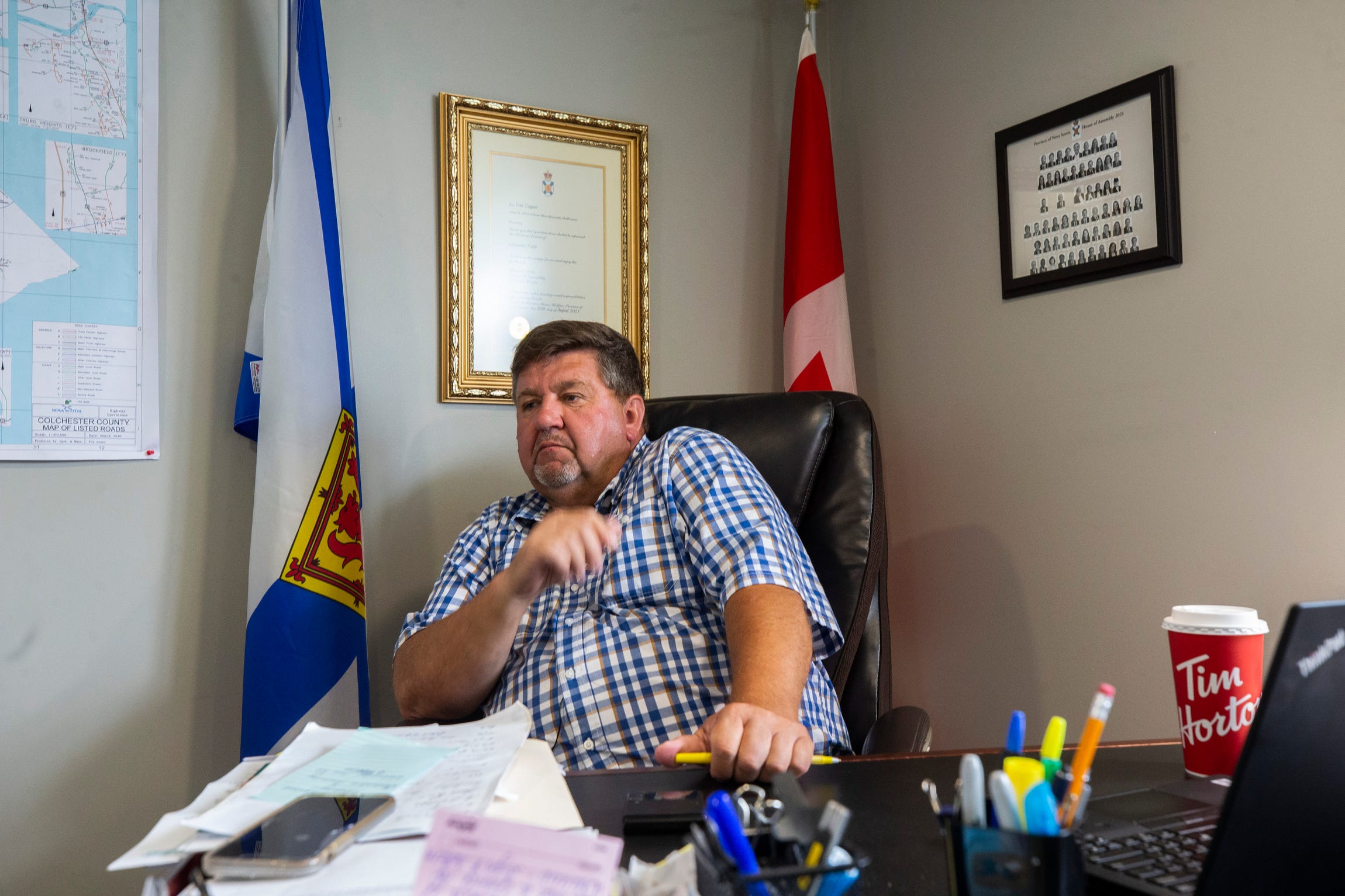
The mass shooter was a wealthy white man, a denturist with a home on the bay. He had a history of domestic abuse against his common-law spouse and a stash of weapons he obtained illegally in Maine and smuggled into Canada.
On Saturday, April 18, 2020, he donned a uniform of the Royal Canadian Mounted Police purchased online and drove Highway 2 in a decommissioned RCMP car he meticulously outfitted with the red, yellow and blue decals of the force. After murdering two neighbors, he killed another neighbor, Lisa McCully, Turner's close friend and a teacher to Turner's then-12-year-old daughter.
Taggart stayed glued to Facebook all morning. By 9 a.m., "suddenly it was real."
People were saying "so-and-so was murdered and you know, and it just kept getting worse and worse and worse and worse and worse," he said. "But every bit of information I got was from was from social media."
The RCMP posted two vague messages to Twitter, one late at night about a "firearms complaint" and another in the morning, but police never sent an emergency alert to cellphones warning the public an active shooter was armed and dangerous and still at large.
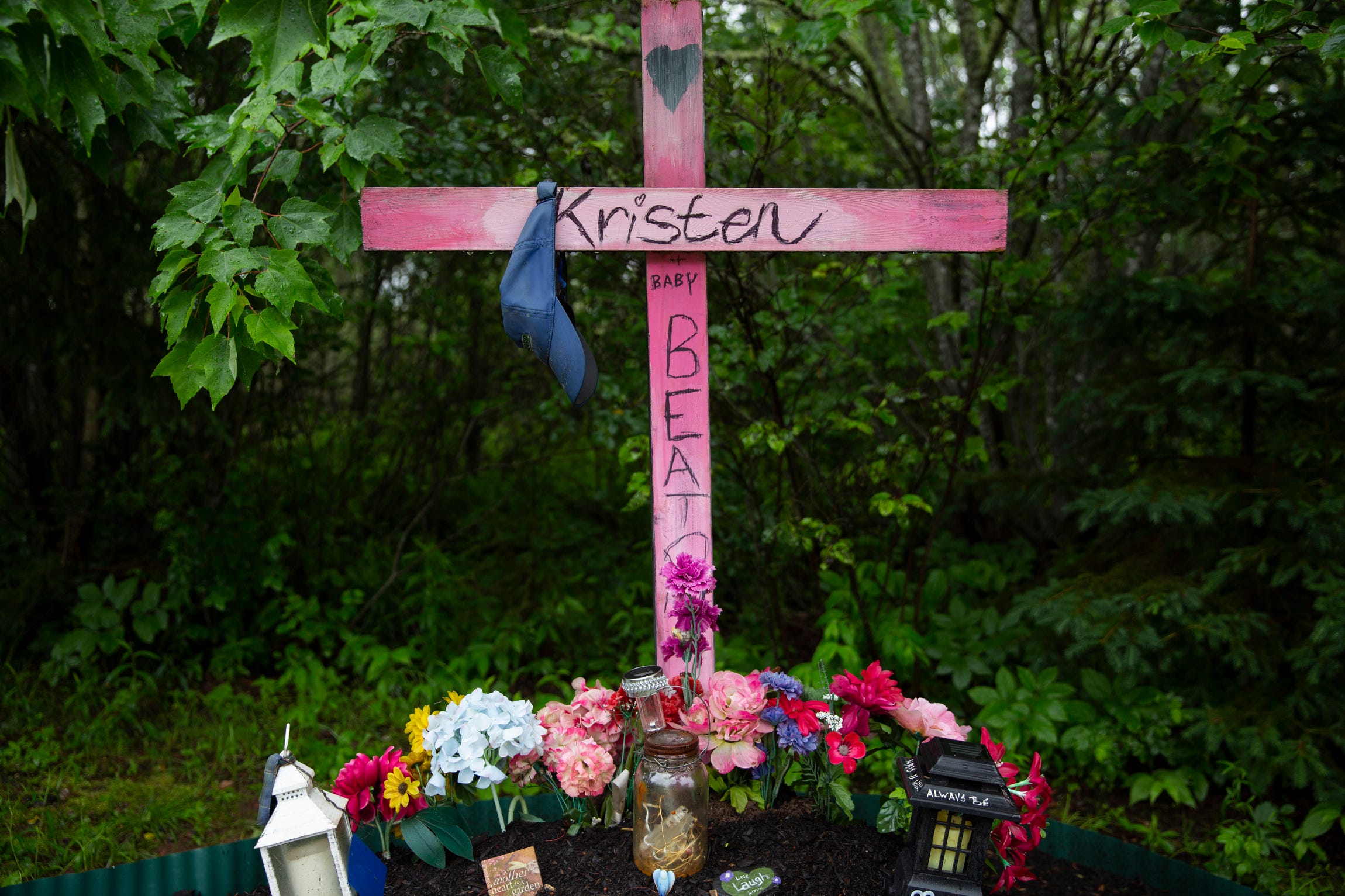
The massacre lasted roughly 13 hours before police shot the gunman dead at a gas station. They recovered five firearms at the scene, three smuggled from the U.S.: a Glock 23 pistol, a Ruger P89 pistol and a Colt Carbine 5.56 semi-automatic rifle.
The victims reflected Nova Scotia's service-oriented society. Among the victims were an RCMP constable; two nurses, including one who was pregnant; two correctional officers; a retired firefighter; a retired couple from New Mexico; a family of three, including a high school senior; parents and grandparents.
At the site of one of the murders, a gazebo was strung with heart charms, one for each of the victims:
- Lisa McCully
- Heidi Stevenson
- Heather O'Brien
- Jolene Oliver, Emily Tuck and Aaron Tuck
- Kristen Beaton and “Baby Beaton”
- Sean McLeod and Alanna Jenkins
- Tom Bagley
- Joey Webber
- Greg and Jamie Blair
- John Zahl and Elizabeth Thomas
- Lillian Hyslop
- Dawn and Frank Gulenchyn
- Gina Goulet
- Corrie Ellison
- Joy and Peter Bond
The difference in gun violence rates in Texas, Canada
A person is 18 times more likely to die by firearm in the U.S. than in Canada, and the likelihood of dying from a bullet is even greater in Texas.
The rate of firearm-related homicide in Canada was 0.73 per 100,000 people in 2020, compared to 13.6 people per 100,000 in the U.S. and 14.2 people per 100,000 in Texas the same year, according to Statistics Canada, the Pew Research Center and U.S. Centers for Disease Control.
Canadians ― unaccustomed to deadly gun violence ― have been alarmed by an increase in firearm-related deaths in recent years. Rates of firearm-related violent crime started an upward climb in 2014. The Nova Scotia massacre contributed to a 22% increase in gun violence in the province in 2020.
"We're learning from the lessons of the United States," said Paul Wozney, president of the Nova Scotia Teachers Union, which lost one of its own in the mass shooting when McCully died. "We are being proactive legislatively. There was a faith that the goodness of small town people will prevent a mass killing, until a small town is the site of a mass killing and we realize the goodness of people isn't enough."
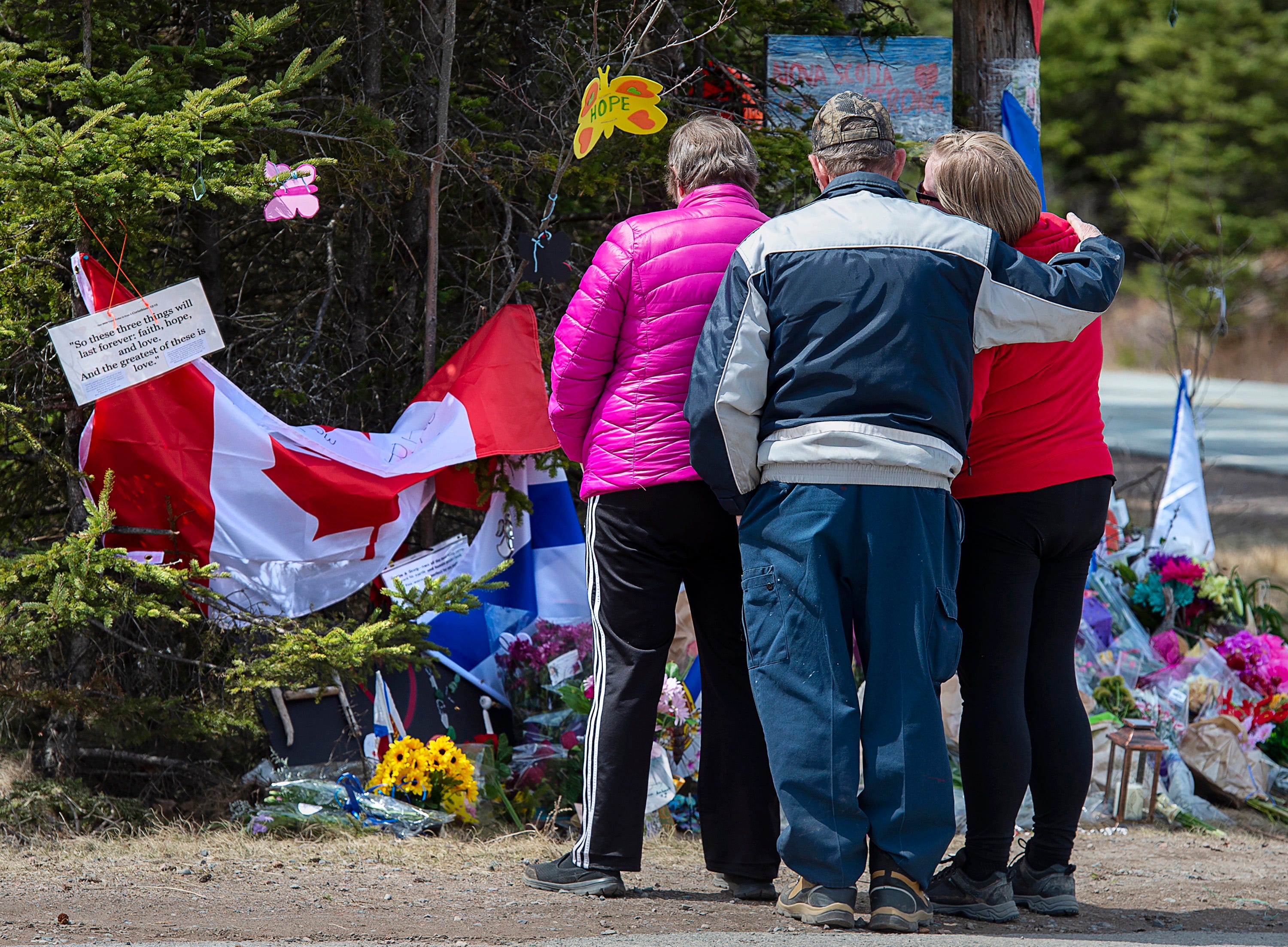
Conservatives weren't happy about the way the government of Prime Minister Justin Trudeau rapidly pushed through the assault weapons ban, but their objections weren't strong enough to stop it.
Conversations around gun restrictions in Texas have been stomped out as quickly as they flared after mass shootings.
Since the 2019 El Paso massacre, Texas has loosened gun restrictions. Gov. Greg Abbott pushed for and signed a bill in 2021 into law that allows Texans to openly carry a gun without a permit. He broadened the school marshal program, allowing more teachers to carry guns in school.
Criminals in Texas don't have to cross state lines or a national border to get a gun. In 2020, the federal Bureau of Alcohol, Tobacco and Firearms successfully traced the firearms used in more than 31,000 gun-related crimes in Texas, including 910 homicides. In 86% of the crimes, or more than 27,000 of them, the gun was bought in Texas.
Once buoyed by loud pledges from public officials to take actions to curb mass shootings, many survivors and their families in Texas feel betrayed, forsaken by Abbott and Republican legislative leaders who refuse to act on their promises to push policy solutions to prevent future gun violence.
In El Paso, "we lost our passion and zeal that we had in the early days of the carnage," said Pastor Michael Grady, whose daughter Michelle was wounded in the Walmart shooting. "What we've done is we've assimilated into an environment where we're silent. We've missed several opportunities to bring attention to the plight of humanity and the pain that we're experiencing in our souls, and it's coming out in gun violence, coming out in division."
Canada successfully traced 30 firearms recovered in 277 gun-related homicides in 2020. Nearly 20% of the firearms came from the U.S., according to Statistics Canada.
"Our gun debate ― if you want to call it that ― is not about you know, those assault-type weapons or that sort of thing," said Taggart, who said he keeps seven hunting rifles locked in a steel cabinet upstairs at his home. Law requires they be stored unloaded, with the ammunition in separate place. Canadians have no right to own a firearm for self-defense.
"We have no need," he said. "Every country has different lifestyles, I guess, but we don't need or care to have a gun to protect ourselves. God help us if we ever get to that place. We're in big trouble if we ever get to that place."
A desire for ‘real answers’ by Nova Scotia shooting victims families
The principal demand by the families of victims in the wake of the Nova Scotia mass shooting was a public inquiry that could deliver real answers about what happened and recommendations about how to prevent another mass shooting. People in Nova Scotia were watching developments in Uvalde, Texas, with special empathy for the families' anger over police accountability and Abbott's admission that recent state actions wouldn't have prevented the deaths.
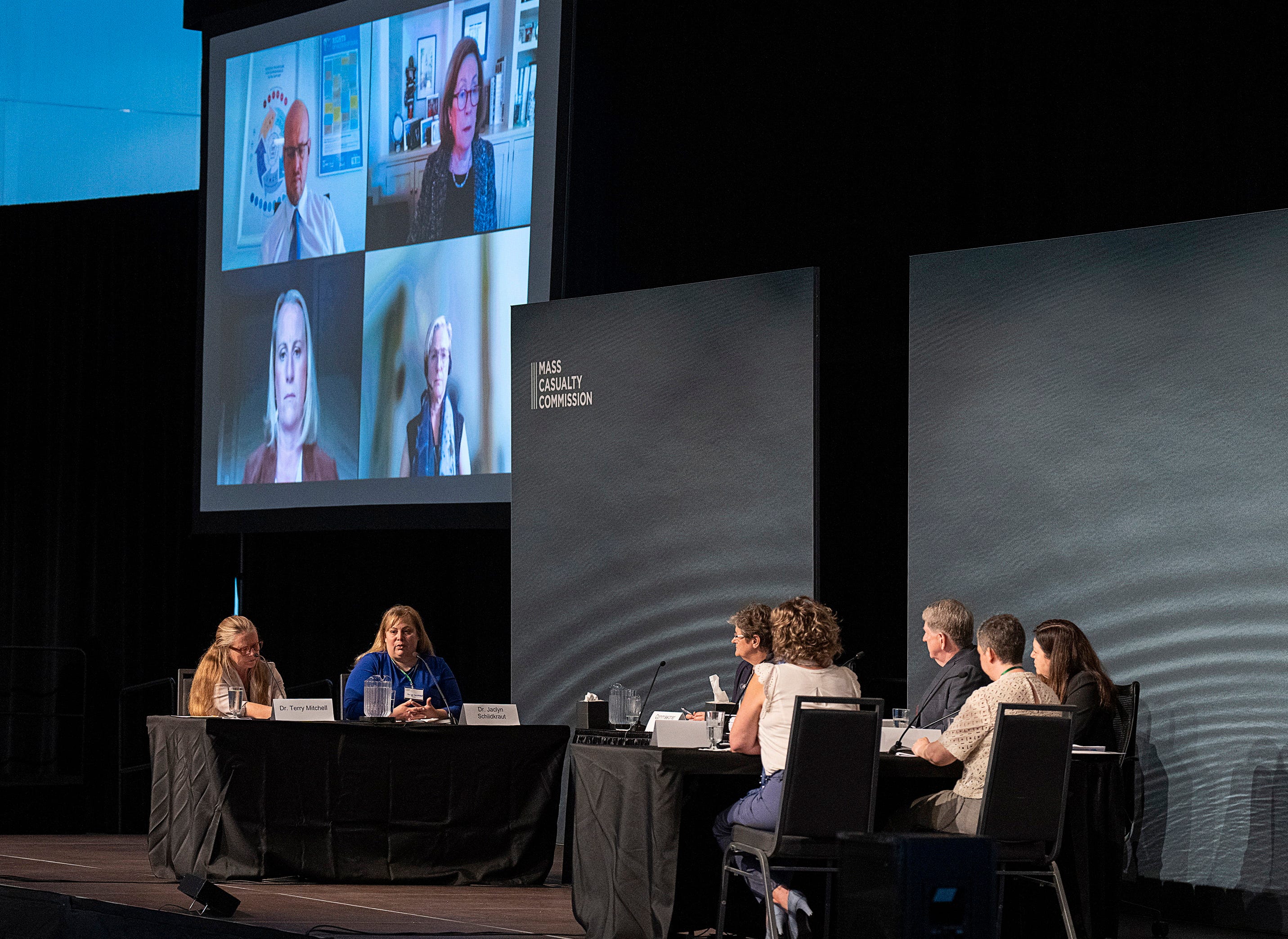
The families' pressure resulted in Canada convening a "Mass Casualty Commission," in which three independent commissioners are spending the better part of two years gathering information about the mass shooting ― including evaluating the police missteps that may have cost lives.
During a recent hearing in June at a Best Western in Truro, Nova Scotia, attorney Josh Bryson listened to the day's witnesses recount breakdowns in law enforcement communications.
"It was seen as a disastrous event," said Bryson, who represents the family of Joy and Peter Bond. "The police weren't ready for it and did not react as they should have. The Mass Casualty Commission is investigating what happened and what can be done in the future. That gives some comfort to the families of the deceased and gives guidance to police forces across the country."
Chairs set up for survivors and family members were all empty that day. According to their attorneys, many are furious that the commission has allowed top law enforcement figures to testify remotely without undergoing the sort of cross-examination that could force them to admit their failures.
"As a representative of this community I'm hoping that at some point there's a recognition of what went wrong, you know, and why it went wrong," Taggart said. "I know the victims' families want to move on to some degree, but they want real answers. They need that closure. But whether we get that or not remains to be seen."
‘We’re definitely not forgetting’
After the farmers market that evening, Young invited everyone over to her farm up the road in Upper Economy. She served up pans of roasted potatoes and cherry tomatoes, sausages and salad.
Turner wore a Portapique Strong tank top she had special-made and brought her husband and two teenage children along. Fulton brought beer and entertained people with piquant stories of his travels, including the time he drove a truck full of goat hides to Ciudad Juárez to trade for cow hides and drank micheladas on the Strip.
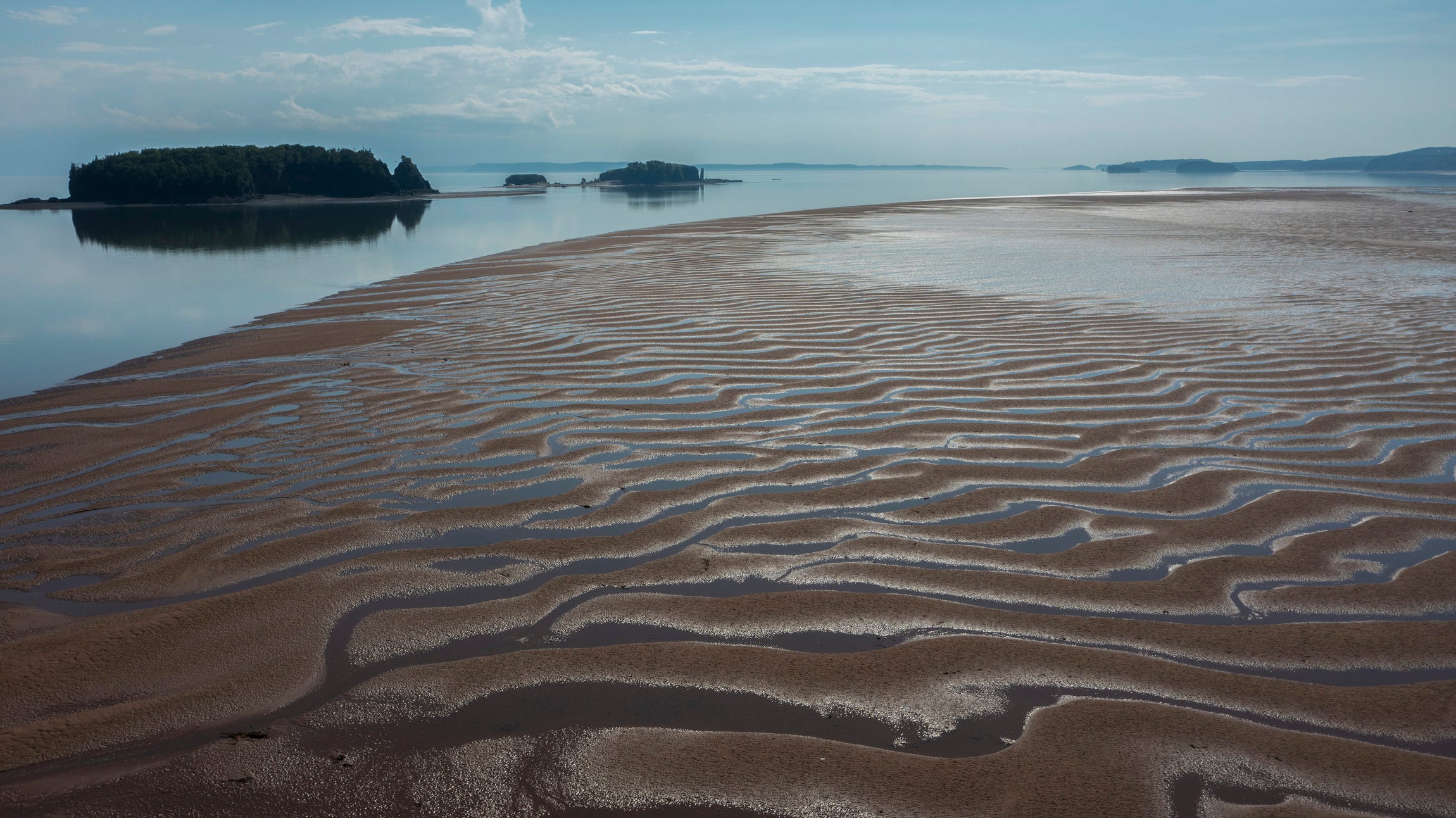
Young built a bonfire. At 9:30 p.m., sunlight still slipped through towering trees. The conversation turned to the tragedy.
What were they going to do with all the memorial items stowed in an antique store's shed?
Just like in El Paso in the wake of the Walmart massacre, people from far and wide had come to pay their respects and left mounds of flowers, notes, art and pictures. Someone had made benches with photos of each of the victims.
Turner stood behind her daughter and nervously twisted the teen's hair. McCully's bench was still in storage, and Turner had considered placing it in her own backyard, to see her friend's smiling face every day. But McCully's sister, with whom she had grown close, couldn't bear it. Turner kept the bench out of sight, honoring her wishes.
"We lived through it, too," she said, "but they lived in it."
"I think you don't forget something by avoiding it," she said. "We're definitely not forgetting. We are still living it every day."
They no longer passed by the gunman's home, as they once had.
The charred remains of the house were razed and gone. The provincial government had purchased the land to ensure no one would turn it into an attraction. There were burn scars on a few birch trees, but a carpet of tall grass and purple lupine covered whatever stones remained.
Saplings had begun to reclaim the land as woods, as earnest and inevitable as the tide.
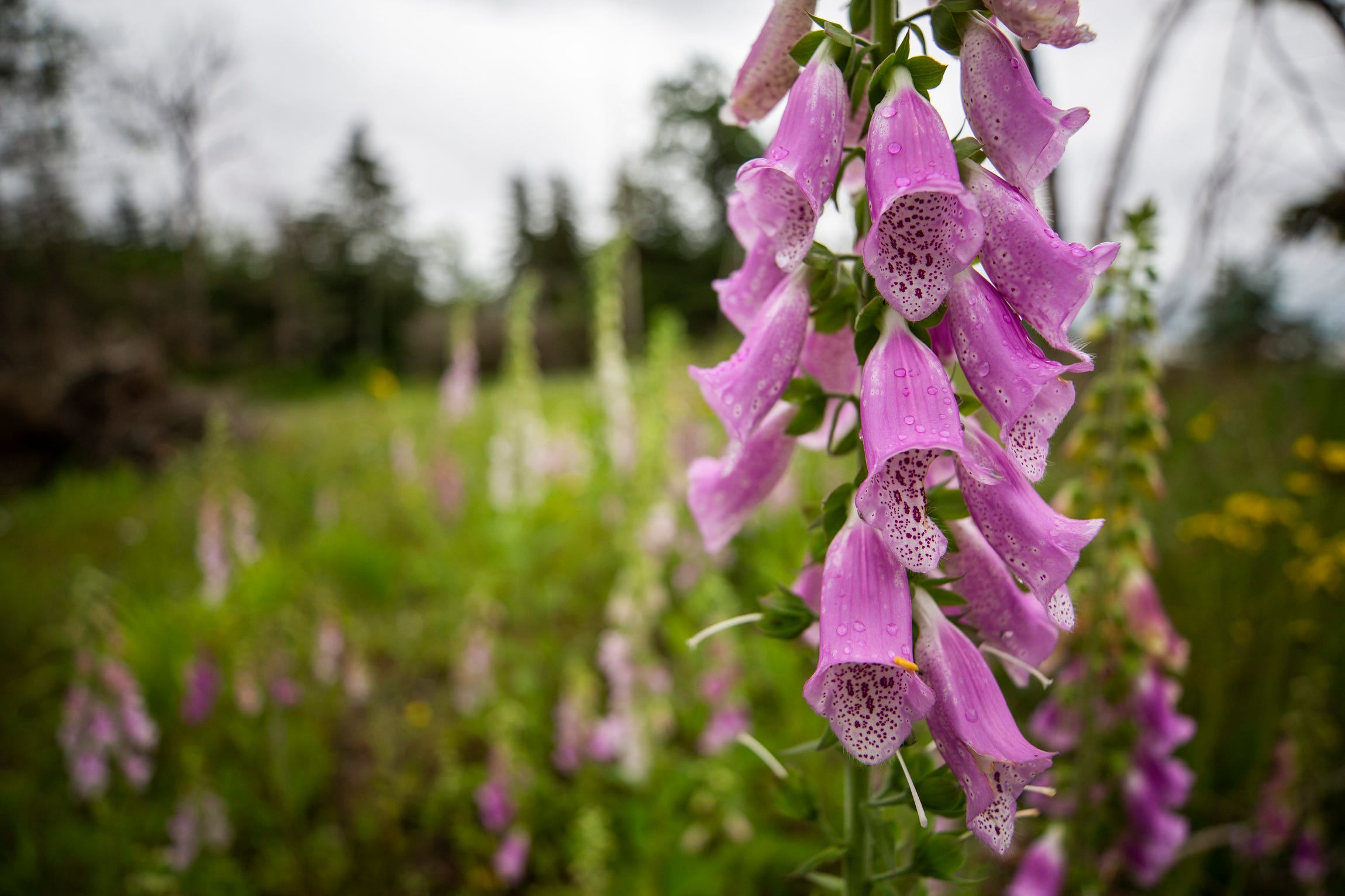
El Paso Walmart shooting victims
- Jordan Anchondo
- Maribel Campos
- Arturo Benavidez
- Andre Pablo Anchondo
- Javier Amir Rodriguez
- David Alvah Johnson
- Sara Ester Regalado Moriel
- Angelina Silva Englisbee
- Adolfo Cerros Hernandez
- Juan de Dios Veláquez Chairez
- Gloria Irma Márquez
- Maria Flores
- Maria Eugencia Legarreta Roth
- Raul Flores
- Jorge Calvillo Garcia
- Alexander Gerhard Hoffman
- Elsa Mendoza de la Mora
- Luis Alfonzo Juarez
- Ivan Filiberto Manzano
- Margie Reckard
- Leonardo Campos Jr.
- Teresa Sanchez
- Guillermo "Memo" Garcia